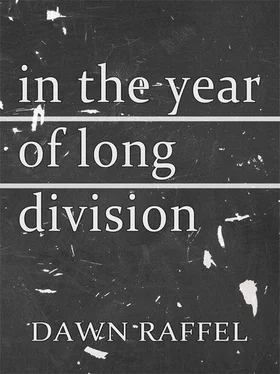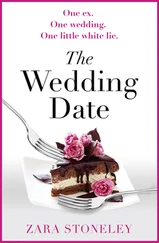Dawn Raffel
In the Year of Long Division
I am deeply grateful to Gordon Lish. I want also to thank Christine Schutt, Heywood Hale Broun, Marsha Spyros of the New York Public Library, my dear friends Cindy Schweich, Emma Segal, and Etta Jacobs, and the editors of the literary magazines who first published these stories. And my family! Brendan and Sean-may you thrive.
DUKE’S brother died under the ice in spring, the season I met Duke. The other kid survived — shivering, fat-lipped, the instigator, littler. A miracle, the search team said. Just a hurt front tooth, a gash, a stitch. A boy’s likely story. This is what I heard, but not from Duke.
Duke said, “Go.”
Duke said, “Ladies first, please.”
Rock, rock, gap, stone-cold to the lighthouse — Duke and I were spiny in the dark. Weeds swam up. Weak sunk stars, a lap, suck, and bubble. The usual. Lake and pier. Us and us. Month after month.
Duke was always finding things to skip across to who knew where.
August.
Pinkness hovered.
A school was in the ebb of the tide, bellied over easy.
“Ready or not,” Duke said.
We were our age.
Fishing was the only sport in our town. How it was. Pick. Any house in our town was any house in our town. Any wind in our town was the wind in our town. Down was down. Queasy was a way of life. Bored to crackers, snap, kerplunk .
That Duke was smart. Had a flat-out daddy, elbow-room. Had boxes’ worth of weatherproof clothes, size close enough. Had any-purpose pockets.
Maybe I obliged. The least I could do.
All the talk in our town was talk, talk, talk. That, no this. Rain, no shine. More, no less. Pardon me, ma’am.
Duke said, “No news is good news.”
Quiet, that was me. To a fault. Sneakers on the rocks. A torn boy’s poncho, blue, somebody else’s breath in the hair. Braids — loose. Skin — pale. Sky — slow and dangerous.
The lighthouse was an eyesore. Fenced to match. Wood — swollen. Tender is what I would have liked to have said. Gulls — posted.
Signs ignored by us.
Single file in the evening, Duke and I.
Ready and not.
NO one was allowed to go beyond a certain point.
Certainly not with Duke.
COMMON — the names they had. The kid. The brother. Had had. Short. Like Duke.
I was the kind of girl to write lists:
Tar.
Rope.
Bone.
Glass.
Hook, I think.
Nylon.
Sand.
Peau de soie .
Chunk.
In the night, on the skin, erasable, rinsable. Or only in the skull.
Imagine.
THE smell of these things was a whole other story. I could be that discreet.
HERE is how it was another way in our town, in any icy season (puddly fall; the holidays — glint, glint and breakage, scouting for the egg in the shy grass): scraped and dug. Glare. Any house in our town was sealed. Any words in our town were used. Any sorrow underfoot.
On the lake: red right encrusted. Pier — tied off. In the mudrooms: boots and salty rinds. Skin and wool, wet. The weight of skin and wool, wet. The feel of skin and wool, wet; not to mention the smell — pale nose scrunched and sunk in a crook, the way a girl would do.
News — dredged.
Coffee — black.
Any window had somebody waiting behind it. Wet air seeped.
In the square of our town: bank, bait and tackle. Gulls and bread. Rx. The hill. The wayward strands of the light.
In the churchyard: Duke. Duke’s sobered-up or anywise daddy, scrubbed. Chin — coarse, perhaps. A kid with a kid’s common name. Me.
This could almost be a scene in our town.
SIX in one — any scene in our town. Before.
THE kind of girl I was, I could swallow ink. Paper, too. A hangnail, laces, possibly a fin, a dove, a jack-in-the-box, cement, and, with a little urgent purpose, someone’s dry wrap, a buoy.
We had local standards. Had to.
I could have won a cup.
SIX in one.
After.
ANY conversation could go like this:
“Go.”
“Ladies first, please.”
Lapse.
Or this: “No news is good news.”
Lapse.
Or this: “Feel?”
Lapse.
Or this: Lapse.
Any lapse in our town was mine. Any pause. Any possible yes.
But only sort of.
SUMMER — easy. So much was obvious, stripped of the cloak of the ice, salt. Duke was Duke. Fish washed up. I was a girl who could see through skin, but only to the bones. Natural events took place. Bells rang. Supper cooled. Corn turned sweet, got picked in another Middle West.
In the mudrooms: mud.
On the doors: screens, gripe in the hinges. Someone on the pier hooked a sock — size boy’s obvious, same as the one that got away.
Duke had a knack. He could tie a tourniquet. Said so.
Heat could wobble. Did so.
Lightning struck us dopey.
In the square of our town: speculation, counter-talk. Knee-bang on Formica. Anybody’s saucer pooled.
By Fridays, anything a body could abide — by rasher, by platter, by bucket, by stretcher: potatoes, potatoes, slaw, slaw, slaw, and something burning.
The keeper of the lighthouse drank. “According to the actual physical record,” as Duke’s daddy told it.
Duke said, “All you can. And after that, then some.”
Duke’s daddy by September got a gut.
I WAS a girl who wanted silk.
Our lake was great. Could have been an ocean.
Under the surface, everything shone.
HERE is how it was in the night with Duke, alone on the pier, a stone’s short throw from the world: We were ourselves. A keeper could blink. I could swallow gristle and muscle; oh, that bloody reek — my heart.
Fell in. Likely. Urge and rage, a boy and girl, and once in, over and over, rage and urge, diving for the thing that would not save us.
THE R’s — the other R’s, not us — had something the matter with their baby. In the summer in the after-dinner light of our street, when Mother and the mothers with babies would be sitting, two and three and four, to cool on cool stoops, to knit and clack or beg and share a lipsticked cigarette, yarns puffing out of bundles at their feet, the arms of sweaters, loose, crissed across a waist, a mother’s belly, a neck — hair rolled; when the babies would be sucking or asleep, Mother and the mothers drinking drinks of bottled pop, tree-tied tires would be swinging, red flies lighting, and poor Mr. next-door M, bushed, being pulled on a leash, one of the two of the boarder nurses hooked up, honked for, riding out of uniform again with men, and children: G’s, J’s, us — C and DR, clovering and fighting and whuffing picky milky balls of weed off weeds, fathers hosing, sweating; when all the goings-on of our street, our lawns, would be going on and on, the R’s — the other R’s — would not, would never, once, come out.
Their house was draped. Tight. Tucked in on the block.
We were made to snoop.
He, Mr. R — not our father — could be seen in the mornings leaving, never coming back. She would be out in the high heat of day, a mother buttoned and bunchy in the elbows, a mother not ours, wearing saddle shoes, a mother passing other mothers’ houses, bumping the carriage on the sidewalk, stepping on the cracks.
The carriage was a dark, hooded thing.
We would hang back to watch — quiet, drawn.
We had heard the priest had come.
We had heard it was supposed to be a boy, this R baby neighbor the nurses swore they had each seen, that the soft nurse said she had bathed once, that the pocked nurse vowed was feeding, gaining its weight.
Читать дальше












